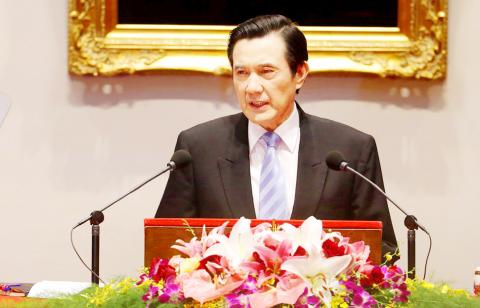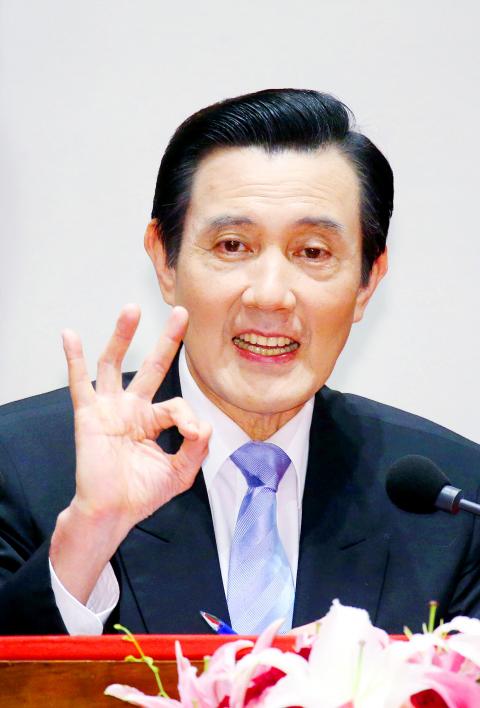President Ma Ying-jeou (馬英九) yesterday again said he would like to sit down with the students leading the massive protest against the cross-strait service trade agreement because he does not understand the rationale behind their opposition to the pact, which he said is vital to Taiwan’s development.
Ma called a press conference at 6pm, ahead of an expected mass demonstration today against the pact, which the government signed with China in June last year and is pending ratification by the legislature.
Hundreds of students have occupied the legislative chamber since March 18 over concerns about negative impacts the pact might have on Taiwan, with an average of thousands of students, members of the public and civil groups joining sit-in protests within and outside the Legislative Yuan compound every day in support of the siege.

Photo: CNA
Ma yesterday offered the government’s latest response to the four demands that would be highlighted in today’s demonstration on Ketagalan Boulevard.
The government rejected the demand that the Executive Yuan withdraw the pact, as Ma said that revoking the pact would deeply harm the nation’s interests.
Ma said the government supports a mechanism to monitor cross-strait negotiations being brought into the legal system, but added that whether it is necessary for a specific bill to regulate cross-strait negotiations being enacted, as the students have demanded, was “open to discussion.”

Photo: CNA
The demand that a review of the cross-strait service trade agreement in the legislature be delayed until the specific bill is passed was “unnecessary,” Ma said, adding that the legislature can handle the two issues “in parallel.”
Ma said he has instructed the Executive Yuan to assess the possibility of holding a citizens’ constitutional conference, as the students have demanded, but he declined to give an estimated timeline for completing the assessment.
As for the possibility that Ma, who doubles as chairman of the Chinese Nationalist Party (KMT), could loosen party discipline so that KMT lawmakers would not be coerced to toe the party line and instead make decisions of their own free will, Ma said that he “holds no sway over the KMT caucus’ decisions.”
“People think I can have anyone punished any time for breach of party discipline. In fact, it is the party caucus’ decision, not mine,” Ma told a press conference, which was rescheduled from 10:30am yesterday to 3pm, and then to 6pm.
Yesterday’s press conference was only the second time that Ma responded to the students’ demands in the past 12 days.
His first press conference on Sunday last week disappointed the students, with some protesters forcing their way into the Executive Yuan that night, followed by an occupation of the compound by thousands of students.
Premier Jiang Yi-huah (江宜樺) then ordered National Police Agency (NPA) Director-General Wang Cho-chiun (王卓鈞) to forcibly evict the protesters from the Executive Yuan compound by dawn, resulting in scores of protesters being injured in what has been termed a bloody crackdown.
The crackdown had prompted calls for Jiang and Wang to resign, but Ma yesterday dismissed the calls, saying that was not necessary.
Ma reiterated that he would like to discuss with students whatever concerns they have about the cross-strait service trade agreement.
“I hope I can explain to the students the contents of the agreement in detail, but we have not been given a chance. I want to invite them for a talk and hope that they can tell me why they are opposed to the agreement,” Ma said.
Ma said he “failed utterly to see” why some people have criticized the cross-strait service trade agreement as being in China’s favor and that it would sell out the interests of Taiwan if it is ratified by the legislature.

The CIA has a message for Chinese government officials worried about their place in Chinese President Xi Jinping’s (習近平) government: Come work with us. The agency released two Mandarin-language videos on social media on Thursday inviting disgruntled officials to contact the CIA. The recruitment videos posted on YouTube and X racked up more than 5 million views combined in their first day. The outreach comes as CIA Director John Ratcliffe has vowed to boost the agency’s use of intelligence from human sources and its focus on China, which has recently targeted US officials with its own espionage operations. The videos are “aimed at

STEADFAST FRIEND: The bills encourage increased Taiwan-US engagement and address China’s distortion of UN Resolution 2758 to isolate Taiwan internationally The Presidential Office yesterday thanked the US House of Representatives for unanimously passing two Taiwan-related bills highlighting its solid support for Taiwan’s democracy and global participation, and for deepening bilateral relations. One of the bills, the Taiwan Assurance Implementation Act, requires the US Department of State to periodically review its guidelines for engagement with Taiwan, and report to the US Congress on the guidelines and plans to lift self-imposed limitations on US-Taiwan engagement. The other bill is the Taiwan International Solidarity Act, which clarifies that UN Resolution 2758 does not address the issue of the representation of Taiwan or its people in

US Indo-Pacific Commander Admiral Samuel Paparo on Friday expressed concern over the rate at which China is diversifying its military exercises, the Financial Times (FT) reported on Saturday. “The rates of change on the depth and breadth of their exercises is the one non-linear effect that I’ve seen in the last year that wakes me up at night or keeps me up at night,” Paparo was quoted by FT as saying while attending the annual Sedona Forum at the McCain Institute in Arizona. Paparo also expressed concern over the speed with which China was expanding its military. While the US

SHIFT: Taiwan’s better-than-expected first-quarter GDP and signs of weakness in the US have driven global capital back to emerging markets, the central bank head said The central bank yesterday blamed market speculation for the steep rise in the local currency, and urged exporters and financial institutions to stay calm and stop panic sell-offs to avoid hurting their own profitability. The nation’s top monetary policymaker said that it would step in, if necessary, to maintain order and stability in the foreign exchange market. The remarks came as the NT dollar yesterday closed up NT$0.919 to NT$30.145 against the US dollar in Taipei trading, after rising as high as NT$29.59 in intraday trading. The local currency has surged 5.85 percent against the greenback over the past two sessions, central